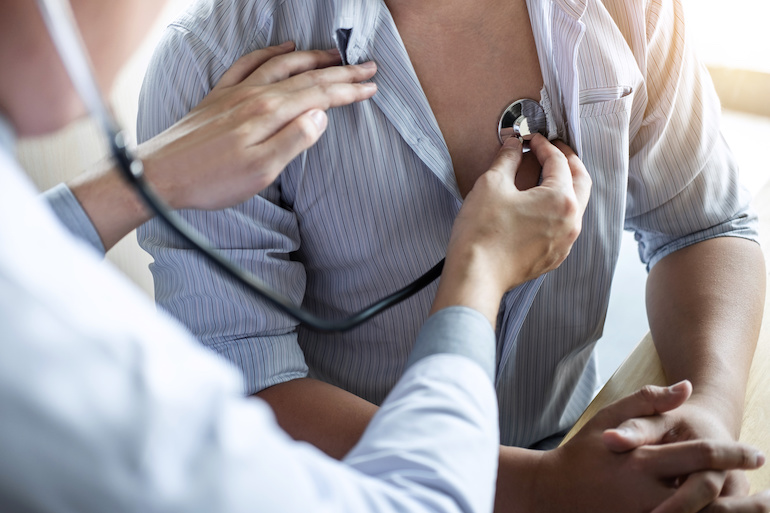10 Heart Disease Facts You Should Know

No patient wants to hear they’ve been diagnosed with heart disease. In fact, more people die from heart disease in the U.S. than any other illness. And, for women over 40, heart disease is the leading cause of death. Nevertheless, with proper medical care and lifestyle changes, many heart patients go on to live long and healthy lives. To help clarify this often misunderstood disorder, here are 10 important heart disease facts.
What is heart disease?
Heart disease, also called cardiovascular disease, is an umbrella term for a variety of conditions that affect the heart. Most heart disorders stem from atherosclerosis, which develops when plaque builds up in the walls of the arteries. This buildup hardens and narrows the arteries, making it harder for blood to flow through.
Heart disease can affect people of all ages. However, it is more common in older adults. Changing your diet and other health habits can help reduce your risk or minimize the chance of a recurrence.
What are the different types of heart disease?
Here is a list of conditions included under the “heart disease” umbrella:
- Coronary artery disease
- Arrhythmias (abnormal heart rhythms)
- Aorta disease
- Heart failure
- Heart valve disease
- Vascular (blood vessel) disease
- Heart muscle disease (cardiomyopathy)
- Pericardial disease (inflammation of the lining surrounding the heart)
- Congenital heart defects (present at birth)
What are the risk factors for heart disease?
While some people are born with a heart defect, most heart disease develops later in life.
Here are some of the risk factors. The more of these factors you have, the greater your chance of developing heart disease.
- Age (cardiovascular risk increases as you age)
- Gender (men are generally at greater risk, while women’s risk increases after menopause)
- Smoking
- Obesity
- High-fat diet
- Lack of regular exercise
- High cholesterol
- High blood pressure
- Diabetes
- Family history of heart disease
- Stress
What are the signs of a heart attack?
Here are the most common signs of a heart attack, according to the American Heart Association:
- Uncomfortable pressure, fullness, squeezing or sharp pain in the center of the chest lasting more than a few minutes
- Pain that spreads to the shoulders, neck or arms
- Chest discomfort accompanied by lightheadedness, fainting, sweating, nausea or shortness of breath
If you experience any of these signs, you should seek emergency treatment immediately.
Do women have different heart attack symptoms than men?
Simply put, the answer is yes. While women may have the same symptoms as men, they also experience signs not usually associated with a heart attack. Therefore, it’s more common for doctors to misdiagnose female patients who have heart attacks.
Here are some of the symptoms a woman may experience:
- Atypical chest pain, stomach, or abdominal pain
- Dizziness or nausea
- Shortness of breath and difficulty breathing
- Unexplained anxiety, weakness, or fatigue
- Palpitations, cold sweat or paleness
What is congestive heart failure?
While the name may sound life-threatening, heart failure does not mean your heart is about to stop working. It means the heart isn’t pumping blood as well as it should, either on one or both sides. People over 65 are more likely to have heart failure, as well as those who have coronary artery disease, high blood pressure or diabetes.
What is a heart arrhythmia?
A heart arrhythmia is an abnormal or irregular heartbeat. A heartbeat can be too slow, too fast or simply irregular.
Symptoms may include a fluttering feeling in the chest, fainting, dizziness, lightheadedness or shortness of breath. People whose heartbeats are too fast may feel like their heart is literally “racing.”
Most arrhythmias are not serious. However, in some cases, your doctor may prescribe medication, an implantable cardioverter-defibrillator (ICD) or an artificial pacemaker.
How does a heart attack differ from a stroke?
In simpler terms, a heart attack is an assault on the heart, while a stroke attacks the brain. A heart attack happens when the flow of blood to the coronary artery is blocked, usually by a blood clot.
A stroke occurs when a blood vessel carrying oxygen to the brain becomes clogged or bursts. Uncontrolled hypertension (high blood pressure) is the major cause of strokes.
What should I do if I think I’m having a heart attack?
If you think you may be having a heart attack, call 911 or go to the nearest emergency room without delay. Many people die from heart attacks because they waited too long to seek medical attention.
Moreover, don’t be embarrassed if it turns out your symptoms were caused by something else. Any doctor would rather treat a case of indigestion or anxiety than lose a patient who refused to get help in time.
What can I do to prevent heart disease?
Heart disease can be prevented or reversed when people make healthy lifestyle changes, especially in the areas of diet and exercise. Here are some recommendations from the American Heart Association:
- Have your blood pressure checked regularly. If your doctor prescribes medication to lower your blood pressure, take it according to the directions.
- Don’t smoke.
- Eat a healthy diet low in saturated fats.
- Exercise regularly and appropriately for your age, size and medical condition. Ask your doctor before you start participating in a new sport or exercise program.
And, if you suspect you or a family member has been a victim of medical negligence, call us. Our team of experienced malpractice lawyers will fight to win the compensation you and your family deserve.
Medical malpractice law is complicated, but finding the right lawyer is simple.
Call 1-800-MALPRACTICE today for a free, no-obligation consultation.
Sources:
- https://www.mayoclinic.org/diseases-conditions/heart-disease/symptoms-causes/syc-20353118
- https://www.cdc.gov/heartdisease/docs/ConsumerEd_HeartDisease.pdf
- https://www.webmd.com/heart-disease/what-is-atherosclerosis#1
- https://www.webmd.com/heart-disease/guide/women-heart-disease#1
- https://medlineplus.gov/heartdiseaseinwomen.html
- https://www.heart.org/en/health-topics/arrhythmia/prevention–treatment-of-arrhythmia


